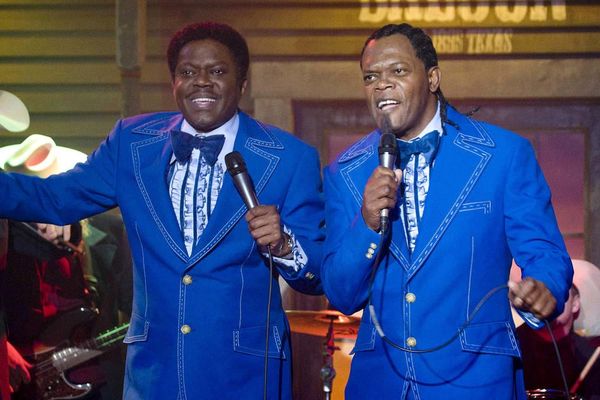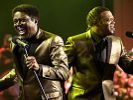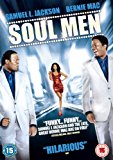Eye For Film >> Movies >> Soul Men (2008) Film Review
Soul Men
Reviewed by: Jeff Robson

As well as producing some of the finest moments in American (and indeed world) pop music, the soul genre is prime material for cinematic treatment.
The triumph over adversity, the creative tensions between a group of guys (and girls) who’d often known each other since childhood, the still all-too prevalent racism that the groups encountered - it’s all pure gold dust and therefore all the more surprising that it’s never inspired a truly great movie.

Dreamgirls looked fantastic but never quite escaped its Broadway crowd-pleaser origins and Robert Townsend’s underrated 1991 epic The Five Heartbeats was perhaps a too-ambitious attempt to cover all the bases of black American music in its golden years. Soul Men doesn’t hit the heights of either, but works well enough as a smart comic two-hander – and as a tribute to Bernie Mac, who died soon after filming was completed.
He plays Floyd, one of the backing singers in a three-man group who make it big in the Sixties. But the sidemen are gradually eclipsed by frontman/creative powerhouse Marcus Hooks (John Legend, the R n’ B er, legend). When Marcus splits the group up Floyd and Louis (Jackson) stagger on as a one-hit-wonder duo before quitting the business altogether.
Flash forward to the present day: Marcus has died suddenly and Floyd (who’s become a used-car salesman but is consigned to a retirement community when his mercenary nephew takes over the business) gets an invitation to perform during a tribute concert at the Apollo in Harlem.
He sees this as an ideal opportunity to reunite with Louis, the group’s other sideman. But Louis has gone seriously off the rails, recently released from prison after an inept attempted bank robbery. Floyd tracks him to his rundown apartment in California and eventually persuades him to take on the gig.
But Louis refuses to fly – a fairly flimsy plot excuse to have the two of them travel across country in Floyd’s Cadillac, reminiscing about the old days, performing ad hoc warm-up gigs at various chicken-in-a-basket venues and gradually realising that, though they had some great times, they always got on each other’s nerves a bit.
This does yield some fun scenes, though director Lee (Spike’s cousin) and the writers often mistake a gross-out interlude or a blizzard of the f-word for genuine humour. The two actors bring a wealth of experience and comic timing to their roles – Mac the constantly-hustling control freak riffs nicely off Jackson’s laid-back free spirit persona.
It’s all ambling on easily enough – but then a cash crisis causes the duo to seek help from Odetta, Floyd’s former wife whose affair with Louis was a prime factor in the group’s break-up. She’s passed on but her daughter Cleo (Leal) has inherited her looks and talent – and her sharp tongue. Cleo’s hard-headed assessment of the two old reprobates whose first visit in years is to ask for money does bring in a bit of much-needed dramatic tension and deflate the general back-slapping atmosphere.
But she agrees to help them get to New York, while her jealous would-be rap star boyfriend pursues her with his posse, and a record company publicist (Herschman) who’s hero-worshipped the duo for years tries to smooth their way – and Floyd starts wondering if he might be Cleo’s dad.
Naturally, the gig at the Apollo provides the climax to all this – and despite a couple of decent plot twists along the way, the climax is a predictably feelgood one. There’s a host of cameos from various soul and R n’ B giants (including Isaac Hayes, who also died soon after filming) and the general effect is as fun and insubstantial as the duo’s novelty hit.
But I could watch Samuel L Jackson recite the phone book - as long as he opened up a can of trouble on its sorry ass at some stage. And he has plenty of opportunities to let rip in fine style here. It’s also a reminder that Mac was a great comic performer, who could often sprinkle a bit of magic on somewhat ordinary material. And Herschman offers a neat supporting turn as the nerdy all-too-white publicist desperate to embrace the Superfly lifestyle he sees the duo as representing.
As you might expect, the soundtrack doesn’t hurt either, offering a combination of pitch-perfect new takes on the classic soul era to fill out the trio’s imaginary back catalogue and some genuine cuts from the period.
Perhaps if Martin Scorsese or Spike Lee ever get the urge to do a biopic of the Four Tops or the Temptations we’ll see the truly great soul movie. In the meantime this is a pretty groovy reminder of what a great era for music that was – and that friendships forged through making music offer a uniquely magnified and amplified take on the everyday matters of getting old and getting along.
Reviewed on: 25 Jan 2011

















